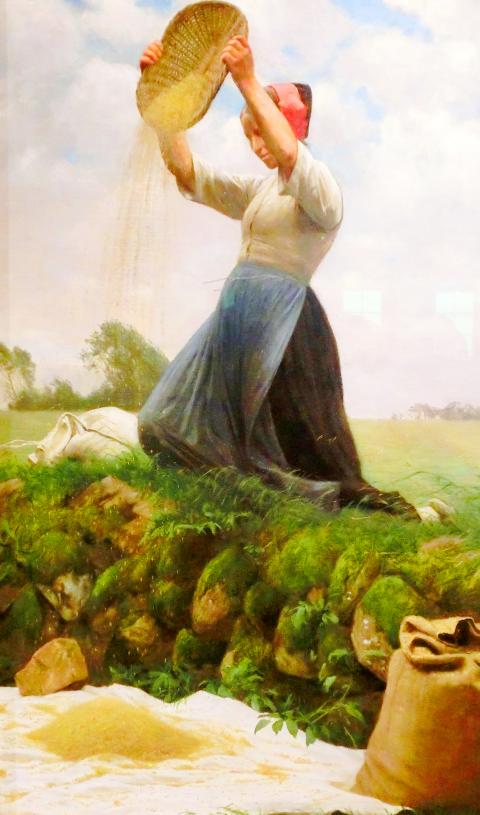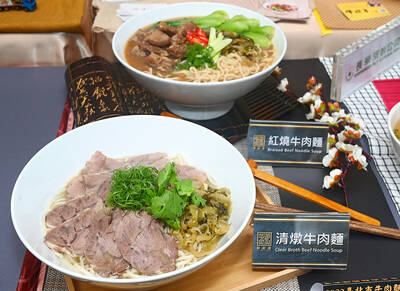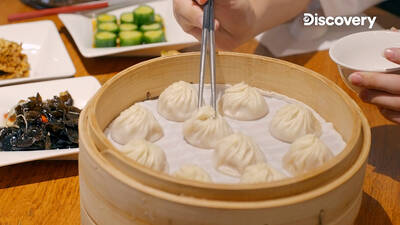Chinese practice
去蕪存菁
discard the weeds, retain the flowers

Photo: Wikimedia Commons
照片:維基共享資源
(qu4 wu2 cun2 jing1)
《四庫全書》是中國史上規模最大的一套叢書,收錄了歷代三千四百多部書,由清乾隆皇帝所任命編纂,於一七七三年開始進行,一七八二年完成,且複製了一些副本,但僅有四部留存下來,其中一部藏於台北國立故宮博物院。
《四庫全書》分為四個部分:經(經典)、史(歷史和地理)、子(哲學)、集(文學選集)。
桂林府知府李文藻(西元一七三○~一七七八年)亦為作家與藏書家,他受《四庫全書》總纂官紀昀(西元一七二四~一八○五年)所託編纂經部。《周易述》(易經評論)為經部所收錄的其中一本書。李文藻指示要刪除《周易述》目錄中過於繁複且與原典無太大關係的部分,他用的語句是「苟汰其蕪雜,存其菁英」,此即為成語「去蕪存菁」的由來。
英語中和「去蕪存菁」意義相當的說法是「separate the wheat from the chaff」。chaff這個字源於中古英語chaf和古英語ceaf,意思是「外殼」,它指的是穀物外層乾燥、難消化的糠?。在古時,農民會對麥子進行「揚穀」,即讓它吹風,這樣糠?就會被吹走,而留下穀粒。
聖經中的〈詩篇〉第一章第四節,便用此作為譬喻,說惡人會像糠?一樣被風吹散。
因此「separate the wheat from the chaff」便指將有用或有價值的東西與無用或無價值的東西區別開來。
(台北時報編譯林俐凱譯)
你這篇文章很有創意,但就是龐雜了點,只要稍加剪裁、去蕪存菁,就會是篇佳作。
(Your article is very creative, albeit a bit rambling. Trim it a bit, get rid of the superfluous parts, and it will be a really good piece.)
簡報要去蕪存菁、把不相關的資訊拿掉,才能夠有效傳達重點。
(The presentation needs to be concise, take away all the irrelevant data. Only then will people get your point.)
英文練習
separate the wheat from the chaff
The Siku Quanshu, or Complete Library in Four Branches of Literature, is the largest collection of books in Chinese history. Covering more than 3,400 titles from successive dynasties, it was commissioned by the Qianlong emperor of the Qing Dynasty. Work on the project started in 1773. It was completed in 1782. Several copies were made, but only four remain, one of those being in the collection of the National Palace Museum in Taipei.
The collection was divided into four parts: Chinese classics (jing), Chinese histories and geographies (shi), Chinese philosophy (zi), and Chinese literature anthologies (ji).
The writer and bibliophile Li Wenzao (1730-1778), a government sub-prefect in Guilin prefecture, was commissioned by Ji Yun (1724-1805), one of the project’s chief editors, to work on the jing collection of Chinese classics. One of the titles was the zhouyi shu (Comments on the Book of Changes). Li gave a direction to remove the parts of the table of contents that were overly complicated, and that had little to do with the original classic. He used the phrase 苟汰其蕪雜,存其菁英, “discard the weeds and retain the flowers,” and from this we get the proverb 去蕪存菁.
The English equivalent for this proverb is “separate the wheat from the chaff.”
The word “chaff” derives from Middle English chaf and from Old English ceaf, meaning “husk.” It refers to the dry, indigestible casing around cereal grain seeds. In ancient times, farmers would “winnow” wheat, meaning to expose it to wind so that the chaff would blow away, leaving only the grains.
In fact, the Bible makes use of the metaphor, with Psalm 1:4, for example, comparing wicked people to chaff that the wind will drive away.
To “separate the wheat from the chaff,” then, means to distinguish between the useful or worthwhile from the useless or valueless.
(Paul Cooper, Taipei Times)
This first stage is about separating the wheat from the chaff. There will be many excellent entries, but also a lot of rubbish.
(第一個階段是汰粕存菁。這裡有很多優秀的作品,但也有很多糟粕。)
Most of this is not worth listening to. It’s just chaff. You need to separate out the good parts.
(這大部分是不值一聽的,就只是些廢話。你得要從中篩選出好的部分。)

A: In its latest annual travel guide, Bloomberg recommended two restaurants in Taipei: Golden Pig barbeque from South Korea and two-Michelin-star restaurant A. B: Also, tourists should definitely try Taiwanese cuisine while they’re here. Mountain & Sea House, Shin Yeh Taiwanese Cuisine, and Fujin Tree Taiwanese Cuisine & Champagne are good options. A: For local snacks, Fu Hang Soy Milk, Fu-Ba-Wang Pigs’ Knuckles Restaurant, and Wang Ji Rice Dumplings are all very popular. B: And the gold medalists of the 2025 Taipei International Beef Noodle Festival — Yun Shui Kitchen, The Howard Plaza Hotel Taipei, and Come N’ Eat

A: Bloomberg just released its annual travel guide, titled “25 Best Places to Travel in 2026.” What were the best Asian destinations? B: There were actually six Asian hotspots: Taiwan’s Taipei, Malaysia’s Penang, Kazakhstan’s Almaty, Indonesia’s Rote Island, India’s Tiger Reserves, and Oman. A: With its mix of traditional food and modern cuisine, Taipei has become a rising food capital in Asia. B: As Bloomberg reported, “Taiwan is a place that bubbles up in culinary conversation because of its famed beverage, bubble tea, and its early adoption of modern night markets.” A: And Din Tai Fung has now

Facing relentless flooding and rising expenses, Dumble Farm in England has stopped selling milk and started an unexpected but therapeutic venture: cow cuddles. In 2022, the owners sold most of their dairy cows and began letting visitors spend time brushing, petting, and even hugging specially trained Highland cows for 95 pounds per session. This unusual shift reflects the rise of the so-called healing economy, a sector where animal-assisted experiences are marketed as emotional remedies for stress and burnout. While dogs and cats remain the most common therapy animals, cows are gaining popularity for their calm nature. At Dumble Farm, only cows that

For many introverts, shy individuals and people with social anxiety, mingling at parties is often draining or arouses uncomfortable emotions. The internal debate about whether or not to attend large get-togethers can get especially intense during the holiday season, a time when many workplaces celebrate with cocktail hours, gift exchanges and other forms of organized fun. “Some people are just not party people,” City University of New York social work professor Laura MacLeod said. “With a workplace holiday party, there’s a pressure to be very happy and excited. It’s the end of the year, it’s the holidays, we’re all feeling grand.